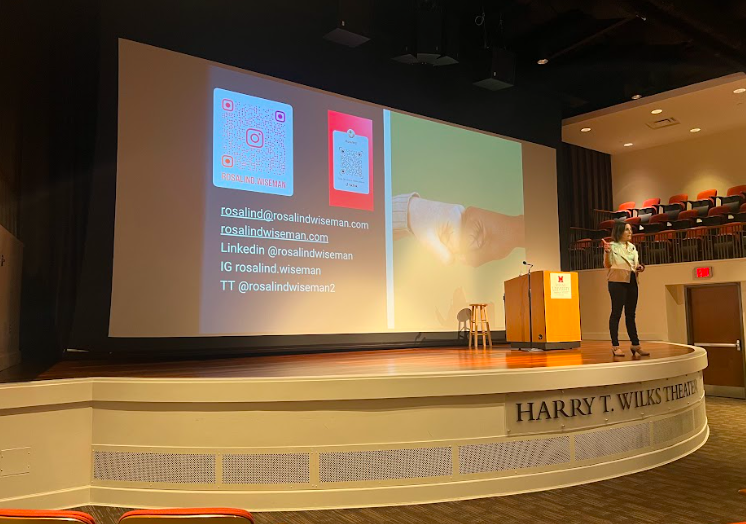Rosalind Wiseman, best-selling author behind the self-help book that inspired the “Mean Girls” franchise, was on campus April 17 to tell Miami students that teens should be respected and listened to, rather than boxed-in and forced to be what adults tell them.
Prior to the speaking engagement, Wiseman attended a group dinner with a small group of Miami students in the Goggin Club Lounge. One hot topic of discussion was control and power of adults over children.
Wiseman said she recognized these issues while attending a private school in Washington D.C. She saw how hypocritical adults could be, and how easy it was for them to abuse their position of power over children.
“Why can’t children make mistakes?” said Wiseman.
As an “advocate for young people and mothers,” she said that children should be seen and listened to by their elders.
“As a young person, I think it’s easy to be dismissed by older people and dismiss their passion[s],” she said.
Wiseman said the majority of people are raised to listen to and respect their elders. However, she said the word “respect” is dishonest and mis-used.
“Using the word respect is almost like an insurance policy for people who have positions of authority to get away with not treating [others] with dignity,” she said. “And yet, every school I have ever been to in this country, has the word respect written on its walls.”
She asked the audience to think of a person in their life that they respect. Many thought of a grandparent, a teacher or a coach that was influential in their lives.
“You didn’t respect them because of their position [of power], but because of how they treated other people and the way they treated other people was with dignity,” she said.
Wiseman taught martial arts to young women after graduating from Occidental College in Los Angeles. The girls she taught would express their issues with social hierarchy, boys, cliques and self-image.
After a decade of speaking with girls and the issues they face in their day-to-day lives, Wiseman wrote the self-help book, ‘Queen Bees & Wannabes’ in 2002, to coach mothers and daughters on how to navigate what Wiseman deems as “girl world.” The book became a New York Times bestseller and the basis for the 2004 hit film, “Mean Girls,” a Broadway adaptation of the film in 2017 and a musical film adaptation released earlier this year.
The book was a bestseller prior to the film’s release, and then became an even more enormous success. The 2004 film grossed $130 million and the 2024 musical adaptation grossed over $104 million worldwide at the box office.
Even now, twenty years after the initial release of the 2004 film, she said she will walk into an airport and see a bachelorette party wearing t-shirts with the phrase “on Wednesdays we wear pink.” She thinks it’s “bizarre” that even now the film is still culturally relevant.
“It has been a very complicated thing in my life,” said Wiseman about her relationship with the film and its success. “But I’m still grateful for it.”
Wiseman made contributions to both the 2004 film and the 2017 musical, but not the 2024 musical movie adaptation. She recalls reading the scripts for the first film and wanting to tweak some of the jokes and comments made in the film.
“I saw [the film] and read the scripts,” she said. “I asked: ‘could [we] not be so stereotypical here? [They are] being too much of a teacher, or, this is too homophobic or racist.’”
Most of her suggestions were not taken. She said she finds stereotyping to be “highly irritating.” She wants to help “break down” the stereotypes of the teenage experience.
Since “Queen Bees & Wannabes,” Wiseman has written seven other books focusing on self-help and one novel, “Boys, Girls, and Other Hazardous Materials,” that she describes as the “hardest thing” she’s ever done. She is also the co-founder of Cultures of Dignity, an organization that partners with communities around the world to help bring dignity and social and emotional learning to all.
More recently, Wiseman has been working in education both domestically and abroad with the U.S. State Department’s Office for Overseas Schools. She wants to help improve the education system, help give young people a voice and “affect system change in a system that doesn’t want to.”
“I have spent my career giving young people a voice,” she said. “I may not always agree with what that opinion is, but that doesn’t matter to me. What matters is that young people have a right to be seen and heard and have a voice and be able to have the freedom to go through their development to become human beings.”








